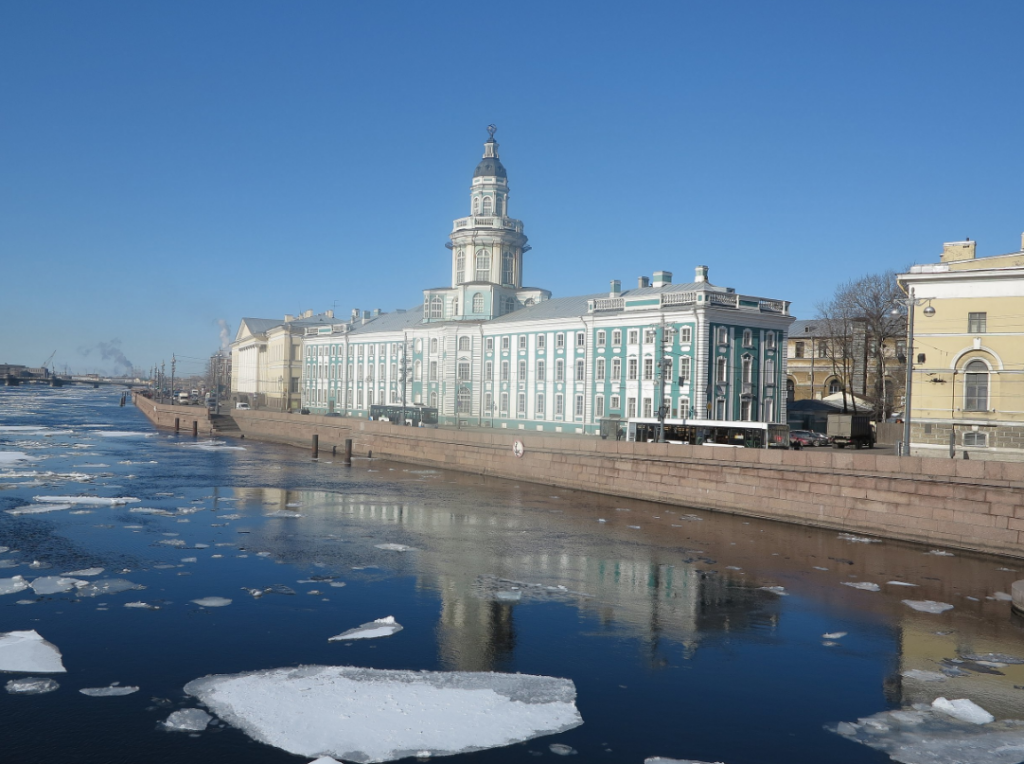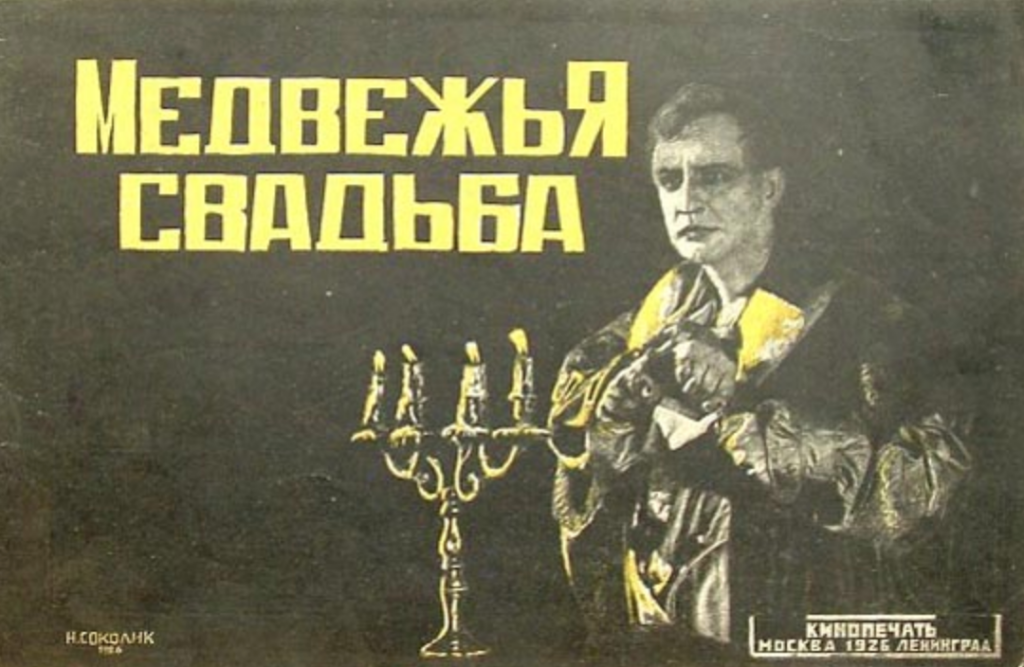The Jordan Center stands with all the people of Ukraine, Russia, and the rest of the world who oppose the Russian invasion of Ukraine. See our statement here.
Amanda Murphy is an Assistant Professor of Russian at Nazarbayev University in Astana, Kazakhstan. She spent February 2022 on a research trip in St. Petersburg, Russia.
In early February 2022, state media was committed to denying the objective reality of Russia's impending invasion of Ukraine. Even harder to stomach than the falsehoods on TV was the xenophobia inherent in Russia’s new mandatory medical exam for all foreigners over the age of six (!) on any type of visa (except Belarusians), which had come into effect on December 29, 2021. Requiring foreigners to pay to be fingerprinted, then be tested for STDs and other infectious diseases every three months, heralded a return to the political atmosphere of the (old) Cold War.
Having spent much of my adult life living and working in Europe and the former Soviet Union, I knew it was routine for employers to pay for incoming workers to undergo medical exams. But there is a distinct difference between this mundane form of medical surveillance and parents paying for their 7-year-old to be tested for HIV and syphilis every 3 months.
Due to the serious penalties for failure to comply with these regulations, I found myself, one early morning, waiting outside a specially designated clinic amid a truly multinational group of foreigners that included Kazakhs, Uzbeks, Turks, French, Indians, and Koreans. Despite the COVID spike, we crowded in chaotically, all eager to be done with this unpleasant new formality. Although they gave us letter-number codes that would allow us to be served, deli-style, it soon turned out that these codes were useless, and the same bureaucrats that had issued us the codes herded us into a pack to pay the hefty fee for the procedures that awaited us, while reproaching us for the disorderly line we had formed.
Some chaos was to be expected, but a number of "special features" caught me by surprise. First, and perhaps most disturbing, was the fact that the doctors and desk-jockeying bureaucrats were entirely earnest about assisting with these procedures. It seemed that none had stopped to think about how absurd, unnecessary, and invasive they were. The iron logic of bureaucracy had edged out the very possibility of insight or empathy: ceasing to be individuals, we were now a mass of identity-less foreigners holding useless letter-number codes.
Equally strange was that this medical center, which was state-of-the-art even for Petersburg. Were they trying to impress us even as we were treated like disease-infested criminals? Or were these facilities meant to show foreigners the might and majesty of the Russian Federation? There was even a swanky coffee bar. Wait—did we come here to hang out?
The procedures were par for the course based on my previous experience in the region: various blood tests, a urine sample, and a chest X-ray, but there were a couple of surprises. In one room, I had to answer questions about my psychological health (I felt great, BTW!). In another, I was told I'd be submitting to a dermatological exam—but the “well-meaning” and earnest nurse instructed me to put my legs in stirrups so that she could collect a sample for a surprise (!) gynecological exam. But why did I comply?
I left feeling violated and dehumanized, reeling from the combination of invasiveness and unavoidability: after all, in order to be granted documents certifying that I was healthy enough to remain in Russia, I had no choice but to submit.
The order wasn't yet over: separately from the tests, I had to return on yet another day to pick up my documents. On that occasion, I caught a snippet of a bureaucrat mocking an Uzbek man: “Go back to your Tashkent if you don’t like it!” It was as though Russia’s window on the world was slamming shut before my very eyes. The openness, experience-sharing, and cultural exchange to which I had devoted my decades-long career were nowhere in sight.
In the theater on Wednesday night, when I realized that the explosions were celebratory, I still hoped that all this foreboding was the product of paranoia. Maybe everything was as it had always been, and St. Petersburg could still be a magical city of museums, theaters, and cafes…
Putin's initial assault on Ukraine, which began in the wee hours of Thursday, February 24, brought home the harsh reality that high culture was merely a gilded facade concealing a brutal reality. Like many Russians and expats, I now had to decide whether to stay or go. I had taken six months off work, and the semester had already begun; I couldn’t return to work and was unlikely to be granted a leave anytime soon. Moreover, I had waited years for a fellowship in Russia and this could be my last chance to make good on my research plans. Initially, I decided to stay.
And then, everyone I spoke to told me this was crazy: I should go. Every time a friend or colleague agreed that I should stay, the same person would write back within a day and retract their advice. I was grasping at straws, looking for a reason to stay. To appease my friends and family, I bought a ticket back to Astana for March 2—just in case. I had no intention of getting on that flight.
But when the time came, I did, in fact, get on that flight. What changed my mind? Though I felt determined to stay, I vacilated for days. I couldn’t rest and felt like I couldn’t really talk to anyone. (I remembered that old cliché: “Just because you’re paranoid doesn’t mean that they aren’t after you.”) I did nothing but check the news and sleep at all the wrong times. So much for staying to devote myself to research.
That Sunday, I took a long walk up Nevsky Prospekt to enjoy the sunny day and the chill in the air, and to clear my mind. As I walked by the Ploshchad’ Vosstaniia metro stop, across from the Moscow Railway Station, a pop-up protest streamed past me, chanting: “Ukraine is not our enemy” and “No to war!” Mostly, these were young men and women who reminded me of my students. Why, I wondered, weren’t they at Gostinyi Dvor? That’s where I had been seeing protesters on social media. As I continued my walk, several other pop-up protests passed me.
I boarded a bus to go up Nevsky—I wanted to see what was going on at Gostinyi Dvor. When we passed it, I understood why protests were traveling through the city: the sidewalk was lined with police cars and paddy wagons. Riot police were standing at the ready. At any moment, they could pull out their nightsticks and begin to beat protestors, then drag them away. Hence the pop-up protests, which were more diffuse and difficult to pin down. I felt a small, temporary glimmer of hope that the demonstrators' ingenuity would prevail.
As the bus passed Palace Square, I was forced to recognize my own naiveté. The place where I had strolled and enjoyed the evening magic just a few days prior had become a base camp for the military and police. Heavily armed police in riot gear encircled the square, where military transport vehicles and buses were parked, ready to travel to any point in the city and crush dissent. At that moment, I realized why the traffic on Nevsky had barely been moving at all—I recalled seeing an unusual number of what looked like non-city buses: police cars driving through the city. They were there to quickly halt any peaceful pop-up protests and carry off the arrestees. This was a police state, and the authorities had planned ahead. My hope evaporated.
I climbed off the bus and walked across the Palace Bridge to the other side of the Neva. I noticed an ice floe, which signified the coming of spring, and was reminded of this repeated image in film and literature, a sign of a new order coming to replace an old one. Vsevolod Pudovkin’s screen adaptation of Maksim Gorky’s Mother (1926), for instance, had used the floating ice to symbolize the breaking-up of the tsarist regime and the growing momentum of the coming revolution. During the Khrushchev Thaw, whose name derives from this phenomenon, flowing ice at the end of winter came to symbolize the end of Stalinist totalitarianism. As I stood and watched the ice, I wondered: what force had been set free? Certainly not freedom from the regime. At that moment, I realized I would leave Russia in a few days, perhaps never to return.



